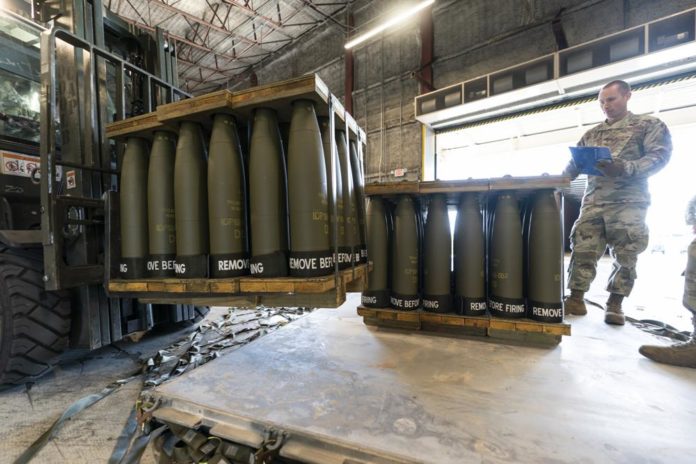
The Biden administration announced Wednesday that it will provide $1.85 billion in military aid to Ukraine, rolling out funding for a Patriot missile battery as Ukrainian President Volodymyr Zelenskyy arrived in Washington for his first known trip out of his country since Russia invaded in February.
The White House announcement came just hours before Zelenskyy landed at Joint Base Andrews, just outside the capital. The package includes $1 billion in weapons and equipment from Pentagon stocks, including the Patriot battery for the first time, and $850 million in funding through the Ukraine Security Assistance Initiative. Part of the USAI will be used to fund a satellite communications system, which likely will include the crucial SpaceX Starlink satellite network system owned by Elon Musk.
“As Russia continues its brutal attacks against critical infrastructure in Ukraine, the United States welcomes President Volodymyr Zelenskyy to Washington, D.C. today to underscore our enduring commitment to the people of Ukraine,” Secretary of State Antony Blinken said in a statement, adding that the U.S. will be providing “critical new and additional military capabilities to help Ukraine defend itself from Russia’s ongoing brutal and unprovoked assault.”
Zelenskyy and other Ukrainian officials have pressed Western leaders to provide more advanced weapons, including the Patriots, to help their country in its war with Russia. The Patriot would be the most advanced surface-to-air missile system the West has provided to Ukraine to help repel Russian aerial attacks.
Also included in the package are two other key items. The Pentagon will send an undisclosed number of Joint Direct Attack Munitions kits, or JDAMs, to Ukraine. The U.S. also will fund satellite communications terminals and services, to shore up a potential vulnerability for Ukraine after Musk said his company could no longer afford to provide the services for free.
The kits will be used to modify massive bombs by adding tail fins and precision navigation systems so that rather than being simply dropped from a fighter jet onto a target, they can be released and guided to a target.
The satellite money would act as a hedge against the possibility that Musk again threatens to stop funding them. Musk shipped the first Starlink terminals to Ukraine just days after Russia invaded in February, and as of October, there were more than 2,200 of the low-orbiting satellites providing broadband internet to Ukraine.
In October he asked the Pentagon to take over the costs for operating Starlink in Ukraine, and tweeted that it was costing SpaceX $20 million a month to support the country’s communications needs.
The system has “been the game changer” in allowing Ukraine’s military and infrastructure to continue to operate, said John Ferrari, a senior fellow and space expert at the American Enterprise Institute. While Wednesday’s funding announcement is for satellite communications terminals and services and doesn’t specify Musk’s company, it would be difficult to introduce other systems onto the battlefield because they often won’t operate well together, Ferrari said.
The decision to send the Patriot battery comes despite threats from Russia’s Foreign Ministry that the delivery of the advanced surface-to-air missile system would be considered a provocative step and that the Patriot and any crews accompanying it would be a legitimate target for Moscow’s military.
But the White House is pushing back against the notion that delivery of the Patriot amounts to an escalation of U.S. involvement on behalf of Ukraine. A senior administration official, who briefed reporters on the condition of anonymity, said that Joe Biden has been clear that his administration would “lean forward” in supporting Ukraine, but it is “not seeking to engage in direct war with Russia.”
It’s not clear exactly when the Patriot would arrive on the front lines in Ukraine since U.S. troops will have to train Ukrainian forces on how to use the high-tech system. The training could take several weeks, and is expected to be done at the Grafenwoehr training area in Germany. To date, all training of Ukraine forces by the U.S. and the West has taken place in European countries.
Also included in the aid package are more rockets for the High Mobility Artillery Rocket Systems, or HIMARS; 500 precision-guided artillery rounds for howitzers; 30 mortar systems and 10,000 mortar rounds; 37 Mine Resistant Ambush Protected (MRAP) Vehicles; 120 Humvees; six armored trucks; more than 2,700 grenade launchers and other weapons, an undisclosed number of HARM air-to-surface anti-radiation missiles; Claymore anti-personnel mines; demolition munitions and other equipment and body armor.
The Ukraine Security Assistance Initiative, which pays for longer-range purchases, will fund more than 200,000 rounds of various types of ammunitions, satellite systems, and ongoing training and maintenance.
This is the 28th time that the Pentagon has pulled weapons off the shelf to deliver quickly to Ukraine, often arriving within days to Europe and the war. Overall, the U.S. has provided about $21.3 billion in military aid and equipment since Russia launched its invasion of Ukraine on February 24.
The aid comes as Congress is poised to approve another $44.9 billion in assistance for Ukraine as part of a massive spending bill. That would ensure that U.S. support will continue next year and beyond as Republicans take control of the House in January. Some GOP lawmakers have expressed wariness about the assistance.
Republished with the permission of The Associated Press.













